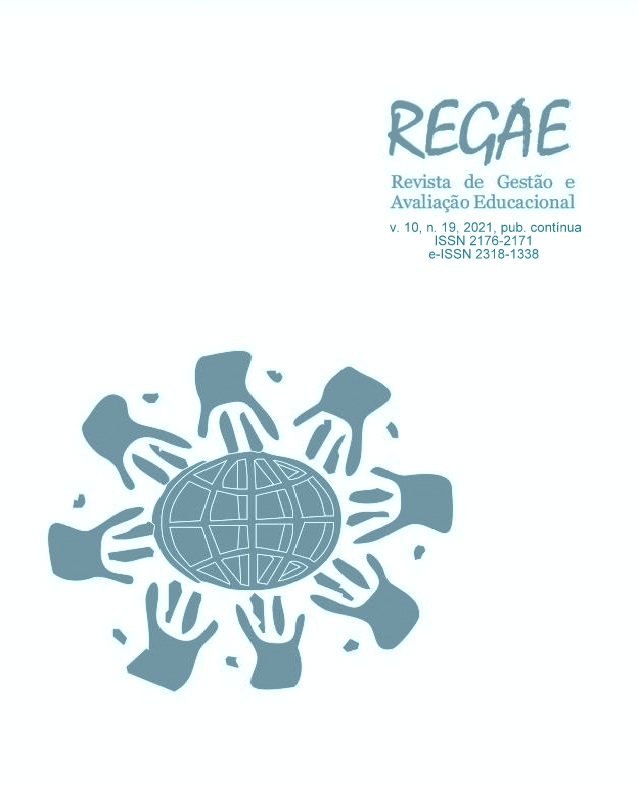Remote education in times of pandemic: the experience of the Colégio La Salle Carmo de Caxias do Sul/RS
DOI:
https://doi.org/10.5902/2318133867283Keywords:
people management, process, education, remote teachingAbstract
This article aims to analyze the remote teaching developed by the team of teachers and pedagogical coordination, from the perspective of people management of the processes, developed in a private school in Serra Gaúcha/RS, during the COVID- 19, in the year 2020. The methodology used is a qualitative, exploratory approach, based on a study case analyzed from the experience and experience of the researchers, in addition to the institution's internal data and carefully selected theoretical references. The target audience of this research is educators, who are essential for guaranteeing remote teaching. The main results were observed from changes in the teachers' thinking, acting and learning throughout the school year. It was concluded that it is possible to maintain a remote and hybrid teaching model - new ways of teaching, management of processes and people, use of active methodologies in remote learning, attractive digital environments - if the school has educators who are available and flexible to changes and work together with students, challenging them to be autonomous and protagonists of a rich and stimulating learning.
Downloads
References
ANDRÉ, Marli. Estudo de caso em pesquisa e avaliação educacional. Brasília: Liber Livro, 2005.
ARAUJO, Luís Cesar G. de; GARCIA, Adriana Amadeu; MARTINES, Simone. Gestão de processos. São Paulo: Atlas, 2011.
BACICH, Lilian; TANZI NETO, Adolfo. TREVISANI, Fernando de Mello. Ensino híbrido: personalização e tecnologia na educação. Porto Alegre: Penso, 2015.
BORGES, Andrade. Treinamento, desenvolvimento e educação em organizações e trabalho. Porto Alegre: Artmed, 2006.
BRASIL. Portaria n. 343, de 17 de março de 2020: dispõe sobre a substituição das aulas presenciais por aulas em meios digitais enquanto durar a situação de pandemia do Novo Coronavírus - Covid-19. Published on: 18/03/2020, edition: 53, section: 1, page: 39. Available at: http://www.in.gov.br/en/web/dou/-/portaria-n-343-de-17-de-marco-de-2020-248564376. Access on 1º jul. 2020.
DESLAURIERS, Jean-Pierre. Recherche qualitative: guide pratique. McGraw-hill, 1991.
ÉBOLI. Marisa. O desenvolvimento das pessoas e a educação corporativa. São Paulo: Gente, 2002.
GIL, Antonio C. Como elaborar projetos de pesquisa. São Paulo: Atlas, 2008.
LARROSA, Jorge; SKILIAR, Carlos. Habitantes de babel: política e poética da diferença. Belo Horizonte: Autêntica, 2001.
LOPES, Paulo Cesar Barbosa; STADLER, Carlos Cesar; KOVALESKI, João Luiz. Gestão da mudança organizacional. Revista de Ciências Humanas, Ciências Sociais Aplicadas, Lingüistica, Letras e Artes, Ponta Grossa, v. 11, n. 1. 2003, p. 51-57.
LÜDKE, Menga; ANDRÉ, Marli. Pesquisa em educação: abordagens qualitativas. São Paulo: EPU, 1986.
OLIVEIRA, Elaine Lima de. Educação corporativa: uma estratégia na gestão de pessoas em instituição de ensino. Available at: https://convibra.org/publicacao/1724/. Access on 10 ago. 2021.
UNESCO. Marco de ação: educação 2030: rumo a uma educação de qualidade inclusiva e à educação ao longo da vida para todos. Brasília: Unesco, 2015.
PAIM, Rafael et al. Gestão de processos: pensar, agir e aprender. Porto Alegre: Bookman, 2009.
RHINOW, Guilherme. Inovando e competindo por meio de gestão de pessoas. Revista de Administração de Empresas, São Paulo. v. 8, n. 1. 2001, p. 2-7.
SOBOLL, Lis Andrea; FERRAZ, Deise Luiza da Silva (org.). Gestão de pessoas: armadilhas da organização do trabalho. São Paulo: Atlas, 2014.
SOUZA, Rosa Fátima de. Tecnologias de ordenação escolar no século XIX: currículo e método intuitivo nas escolas primárias norte-americanas (1860-1880). Revista Brasileira de História da Educação, São Paulo, n. 9, 2005, p. 9-42.
TRIVIÑOS, Augusto Nibaldo Silva. Introdução à pesquisa em ciências sociais: a pesquisa qualitativa em educação. São Paulo: Atlas, 1987.
YIN, Robert. Estudo de caso: planejamento e métodos. Porto Alegre: Bookman, 2005.
Downloads
Published
How to Cite
Issue
Section
License
Authors keep copyright and concede to the magazine the right of first publication, with the work simultaneously licensed under the Creative Commons Attribution 4.0 International, non-commercial license with no derivative work, which allows to share the work with no author recognition and initial publication in this magazine.
Authors has authorization to overtake additional contracts separately, to distribute a non-exclusive version of the work published in this magazine: For example: to publish in an institutional repository or as a chapter of a book, with authorial recognition and initial publication in this magazine.
Authors are allowed and are encouraged to publish and distribute their work online. For example: in institutional repositories or in their own personal page – at any point before or during the editorial process, because this can result in productive changes, as well as increase the impact and the mention to the published work.






